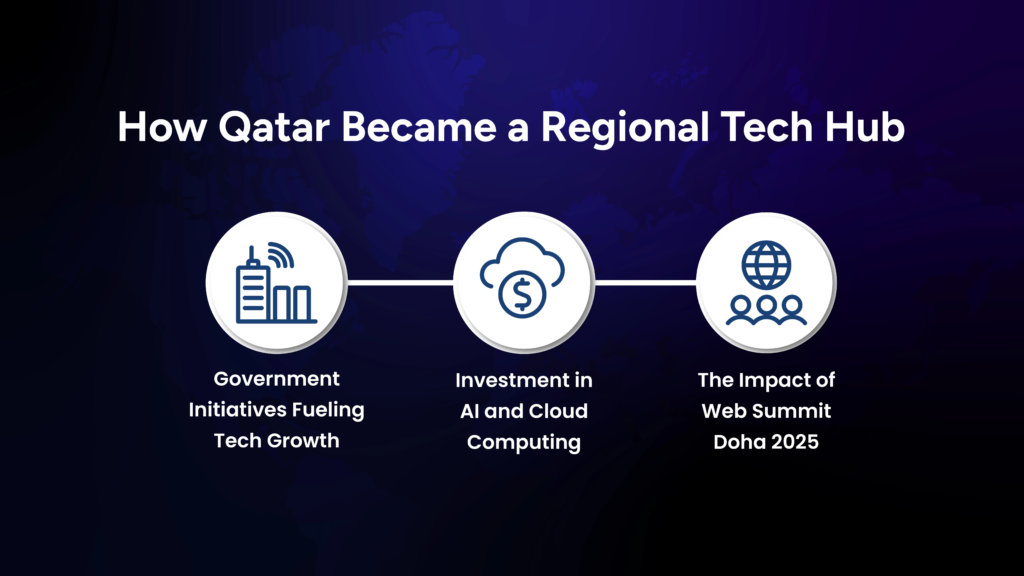In recent years, Qatar has experienced a remarkable surge in financial technology, or fintech Growth . Traditionally known for its oil and gas exports, the country is now emerging as a digital finance leader in the Middle East. With the Qatar National Vision 2030 acting as a compass, the nation is taking strategic steps to diversify its economy and fintech is a powerful pillar of that transformation.
What started as a few tech-based financial services has now become a thriving ecosystem. From contactless payments to blockchain security platforms, Qatar is pushing boundaries and creating new standards for how finance works in the region.
Strategic Government Initiatives Fueling Fintech Growth
The Qatari government plays a pivotal role in this rapid growth. Through organisations like the Qatar Central Bank (QCB) and the Qatar Development Bank, major support systems have been launched to encourage financial innovation. One of the most notable is the Qatar FinTech Hub (QFTH), which provides funding, mentorship, and global exposure to startups.
The National FinTech Strategy laid out by the QCB provides a road map to ensure sustainable growth. It covers regulation, cyber security, partnerships, and open banking. This kind of vision-driven leadership is what separates Qatar from many regional players.
The regulatory sandbox concept is also helping new fintech companies test their services under controlled conditions. This makes it easier for innovators to enter the market without navigating overwhelming bureaucracy.
How Fintech Is Reshaping Consumer Behavior
Fintech in Qatar isn’t just transforming the economy it’s changing how people think about money. Mobile banking, digital wallets, peer-to-peer transfers, and investment apps are now part of everyday life, especially for younger generations.
Consumers in Qatar are rapidly shifting to cashless transactions. The convenience, speed, and safety offered by fintech services are appealing to both nationals and expatriates. This behavioural change has pushed traditional banks to partner with or acquire fintech companies to remain relevant in this new digital era.
In this new landscape, the power is shifting to consumers who now expect 24/7 service, intuitive interfaces, and smart financial advice right at their fingertips.

The Role of Innovation Hubs and Startups
At the heart of Qatar’s fintech success is its growing startup ecosystem. Dozens of local fintech companies have emerged in recent years, offering solutions for payments, lending, wealth management, and more. These startups are solving real-world problems with homegrown innovations tailored to the Qatari and GCC market.
The Qatar FinTech Hub (QFTH) plays a key role in incubating these ideas. Its accelerator programs attract global attention and foster collaborations between early-stage startups and large financial institutions.
What’s particularly exciting is that many of these startups are now looking beyond Qatar. They are entering markets like the UAE, Oman, and Saudi Arabia, showcasing Qatar’s potential as a regional innovation exporter.
Impact on Regional Economic Integration
The ripple effect of Qatar’s fintech boom is being felt across the Middle East. By enabling faster cross-border transactions, shared banking APIs, and blockchain-secured remittance platforms, Qatari fintech solutions are knitting the region closer together.
Financial integration between GCC countries is becoming more seamless. Fintech is making it easier for migrant workers to send money home, for investors to move capital across borders, and for SMEs to trade beyond their national limits.
This growth is also encouraging regional governments to align regulatory frameworks, making it easier for fintech firms to scale their operations across the Gulf with fewer barriers.
Empowering Small Businesses and Entrepreneurs
Small and medium-sized enterprises (SMEs) form the backbone of most economies, and in Qatar, fintech is proving to be a game-changer for them. Access to credit, which was traditionally difficult for smaller firms, is now more attainable thanks to digital lending platforms and peer-to-peer loan models.
AI-driven credit scoring systems help lenders assess risk more accurately, allowing more entrepreneurs to qualify for funding. Digital platforms also offer tools like invoice financing, payroll automation, and financial forecasting, empowering SMEs to grow sustainably.
This kind of support is vital not just for businesses but for the broader Qatari economy, which is actively working to reduce its reliance on oil and diversify into knowledge-based sectors.

Fintech’s Role in Achieving Financial Inclusion
Fintech is opening doors for people who were previously excluded from the financial system. This is especially important in Qatar, where a large percentage of the population consists of expatriate workers who may not have had full access to traditional banking services.
With mobile banking, e-wallets, and low-fee remittance services, more individuals now have safe and easy ways to manage their finances. Some platforms even offer micro-insurance products and instalment-based savings plans tailored for lower-income users.
By increasing financial inclusion, fintech isn’t just helping people access banking it’s giving them the tools to improve their lives, build savings, and participate more fully in the economy.
Strong Regulation and Cybersecurity Frameworks
In any digital economy, trust is everything. Qatar understands this and has made regulatory oversight and cyber security top priorities.
The Qatar Central Bank has implemented strict regulations that encourage innovation while protecting consumers. These include detailed guidelines for anti-money laundering (AML), know-your-customer (KYC) compliance, and data privacy.
To further boost confidence, Qatar has invested in world-class cyber security infrastructure. Continuous monitoring, threat intelligence, and secure cloud services ensure that fintech platforms operate with maximum safety and transparency.
This balance of innovation and regulation is why investors and users alike feel confident engaging with Qatari fintech companies.
International Collaborations Strengthening Fintech Ecosystem
Qatar is not building its fintech landscape in isolation. The country has actively formed alliances with international fintech bodies, venture capitalists, and research institutions.
These collaborations are bringing in global best practices, advanced technologies, and valuable mentorship for local startups. For example, partnerships with European and Asian fintech hubs have introduced advanced use cases in open banking, digital identity, and blockchain.
These global links not only help Qatar accelerate its fintech development but also position it as a connector between East and West in the global financial landscape.
Future Outlook: A Bold Vision Ahead
Looking ahead, Qatar’s fintech journey is just getting started. With the legacy of the FIFA World Cup 2022 and continued investments in smart city development, the digital momentum is set to increase.
The government’s focus on emerging technologies like AI, quantum computing, and blockchain will create even more disruptive opportunities in the years to come. Experts predict that by 2030, Qatar could become the leading fintech hub in the Middle East.
A strong talent pipeline, robust infrastructure, and consistent policy making will continue to attract global players and nurture local champions. The focus now is not just on adoption, but on invention — creating fintech solutions that can scale globally.
Final Thoughts
Qatar’s fintech revolution is much more than a trend it’s a defining shift in how the country approaches growth, inclusion, and innovation. The nation has shown that with the right mix of vision, support, and technology, even a traditionally oil-rich country can become a fintech powerhouse.
From transforming consumer behaviour to enabling small business growth, from boosting regional integration to pioneering new technologies the impact is massive, and it’s just beginning.
As Qatar leads the way, it is setting an example for the entire Gulf region. The fintech future is here, and it’s being built in Doha.
Do follow Gulf Magazine on Instagram
Also Read – Smart City Technology Transforming Doha Into a Global Innovation Leader


